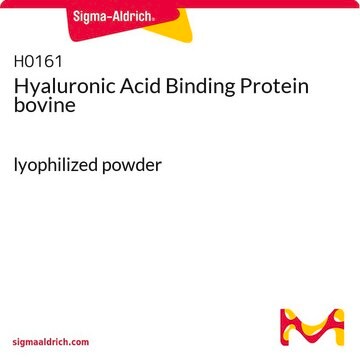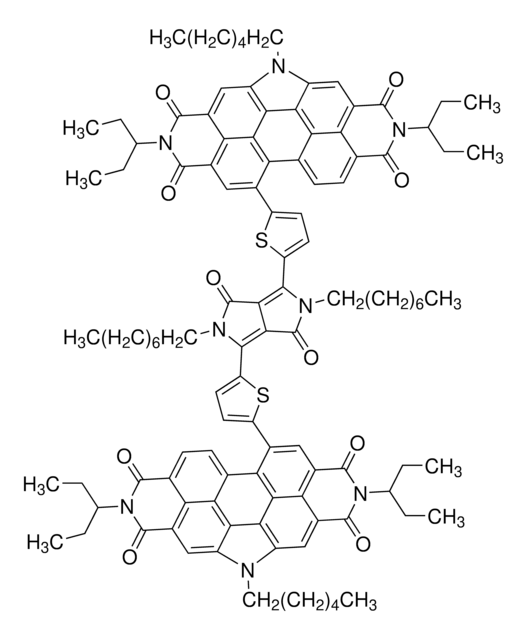927201
TissueFab® bioink
(GelHA)ma -Vis/405nm, low endotoxin
Sinónimos:
HAMA bioink, HAMA-LAP, Hyaluronic Acid Methacrylate Bioink, Low endotoxin
Iniciar sesiónpara Ver la Fijación de precios por contrato y de la organización
About This Item
UNSPSC Code:
12352201
NACRES:
NA.25
Productos recomendados
¿Está buscando productos similares? Visita Guía de comparación de productos
General description
TissueFab bioink (GelHA)ma -Vis/405nm, low endotoxin bioink is a hyaluronic acid methacrylate and GelMA based bioink for 3D bioprinting applications. Lithium phenyl-2,4,6-trimethylbenzoylphosphinate (LAP) is a water soluble, cytocompatible, Type I photoinitiator for use in the polymerization of hydrogels or other polymeric materials. This photoinitator is preferred over Irgacure 2959 for biological applications due to its increased water solubility, increased polymerization rates with 365 nm light, and absorbance at 400 nm allowing for polymerization with visible light.
Gelatin methacryloyl (GelMA) is a polymerizable hydrogel material derived from natural extracellular matrix (ECM) components. Due to its low cost, abundance, and retention of natural cell binding motifs, gelatin has become a highly sought material for tissue engineering applications. Hyaluronic acid (HA) is a linear polysaccharide of alternating D-glucuronic acid, and N-acetyl-D-glucosamine found in the extracellular matrix. HA is commonly chemically modified to form covalently crosslinked hydrogels.
Gelatin methacryloyl (GelMA) is a polymerizable hydrogel material derived from natural extracellular matrix (ECM) components. Due to its low cost, abundance, and retention of natural cell binding motifs, gelatin has become a highly sought material for tissue engineering applications. Hyaluronic acid (HA) is a linear polysaccharide of alternating D-glucuronic acid, and N-acetyl-D-glucosamine found in the extracellular matrix. HA is commonly chemically modified to form covalently crosslinked hydrogels.
Application
The formulation is optimized for 3D bioprinting of tissues and constructs using extrusion based 3D bioprinters, and can be can be used to bioprint cell-laden hydrogels in desired shape without any supporting material. The crosslinking of printed structures can be done in one step using visible light for further culture and maturation of cells for tissue engineering and regenerative medicine applications.
Low Endotoxin, low bioburden: Endotoxins have been demonstrated negatively impact cellular growth, morphology, differentiation, inflammation and protein expression. Bioburden is defined as the number of contaminated organisms found in a given amount of material. We test each lot for endotoxins as well as total bioburden (aerobic and fungal) to minimize unwanted interactions. For more information: https://www.sigmaaldrich.com/US/en/technical-documents/technical-article/microbiological-testing/pyrogen-testing/what-is-endotoxin
The protocol can be found under "More Documents" at the bottom of the page.
Low Endotoxin, low bioburden: Endotoxins have been demonstrated negatively impact cellular growth, morphology, differentiation, inflammation and protein expression. Bioburden is defined as the number of contaminated organisms found in a given amount of material. We test each lot for endotoxins as well as total bioburden (aerobic and fungal) to minimize unwanted interactions. For more information: https://www.sigmaaldrich.com/US/en/technical-documents/technical-article/microbiological-testing/pyrogen-testing/what-is-endotoxin
The protocol can be found under "More Documents" at the bottom of the page.
Legal Information
TISSUEFAB is a registered trademark of Merck KGaA, Darmstadt, Germany
Storage Class
10 - Combustible liquids
wgk_germany
WGK 3
Certificados de análisis (COA)
Busque Certificados de análisis (COA) introduciendo el número de lote del producto. Los números de lote se encuentran en la etiqueta del producto después de las palabras «Lot» o «Batch»
¿Ya tiene este producto?
Encuentre la documentación para los productos que ha comprado recientemente en la Biblioteca de documentos.
Michelle T Poldervaart et al.
PloS one, 12(6), e0177628-e0177628 (2017-06-07)
In bone regenerative medicine there is a need for suitable bone substitutes. Hydrogels have excellent biocompatible and biodegradable characteristics, but their visco-elastic properties limit their applicability, especially with respect to 3D bioprinting. In this study, we modified the naturally occurring
Sudhir Khetan et al.
Cryobiology, 90, 83-88 (2019-08-06)
While significant progress has been made in directing the behavior of cells encapsulated within three-dimensional (3D) covalently crosslinked hydrogels, the capacity of these materials to support in situ cryopreservation of cells directly within the gels has not been assessed. Here
Nuestro equipo de científicos tiene experiencia en todas las áreas de investigación: Ciencias de la vida, Ciencia de los materiales, Síntesis química, Cromatografía, Analítica y muchas otras.
Póngase en contacto con el Servicio técnico








